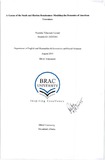| dc.contributor.advisor | Chowdhury, Rukhsana Rahim | |
| dc.contributor.author | Lohani, Nusmila Tabassum | |
| dc.date.accessioned | 2017-05-23T10:05:03Z | |
| dc.date.available | 2017-05-23T10:05:03Z | |
| dc.date.copyright | 2015 | |
| dc.date.issued | 2015-08-08 | |
| dc.identifier.other | ID 10205001 | |
| dc.identifier.uri | http://hdl.handle.net/10361/8174 | |
| dc.description | This thesis is submitted in partial fulfillment of the requirements for the degree of Bachelor of Arts in English, 2015. | en_US |
| dc.description | Cataloged from PDF version of thesis. | |
| dc.description | Includes bibliographical references (page 31-33). | |
| dc.description.abstract | A genius of The South and Harlem Renaissance: Moulding the Dynamics of American Literature" is the speculation of the literary movement in the 1920's and its effects on twentieth century American literature. In an attempt to study and relate literary publications of the Harlem Renaissance and present the theoretical and practical application of the socio-psychology mind-set of the then black artists, the research behind this paper speculates the visceral and intellectual passion which propelled the literary movement. First of its kind in the black community, the Harlem Renaissance was the "birth" of a new consciousness of the African-American literary artists.
Essentially divided into five chapters; the first two chapters serve as dialect to give a historical overview and analysis of the movement. The second chapter draws relationships between the seminal work of African-American literature, viz-a-viz, The Souls of Black Folks; the psychology of the 1920's black intellectuals, viz-a-viz, primitivism and the philosophy of the father of Harlem Renaissance, Alain Locke's selected works of philosophy and sociology. Chapter II demonstrates the historical and psychological overview of the Harlem Renaissance and designs a construct to better understand the dynamics of the glorious movement. Chapter III is the embodiment of the literary icon of the movement, Zora Neale Hurston's reflection on black pride in literature and her passionate inclination to defy all odds and excel in life, under circumstances of racial discrimination. In fact, the third chapter serves as the core of the thesis in dealing with the aspirations of "A Genius of the South" and her strength and prowess in literature which greatly influenced female African-American writers and others of later generations. The following chapter is the reflection of the resonance of the Harlem Renaissance in other aspects than literature, such as music and politics. It is a brief overview of the ripple effects of the movement in the realms of other artistic and social spheres in Harlem and beyond in America. The last chapter is the largest in portion and conducts a study to present the influence of the Harlem Renaissance authors, particularly Zora Neale Hurston on other twentieth century Afiican-American authors who have wielded the dynamics of American literature, to say the least.
In five chapters, this paper attempts to draw connections and states how it was the relentless and incorruptible passion of the Harlem Renaissance authors which passed on in later generations of authors and had a true, impeccable impact on the American literature. It is the urgency and black pride in literary works such as Claude Mckay's poem If We Must Die and Zora Neale Flurston's essay How, It Feels to be Colored Me which propelled the movement and gave the world a literature of stupendous rich culture, heritage and creative spirit which ensued for decades ever since. | en_US |
| dc.description.statementofresponsibility | Nusmila Tabassum Lohani | |
| dc.format.extent | 33 pages | |
| dc.language.iso | en | en_US |
| dc.publisher | BRAC University | en_US |
| dc.rights | BRAC University thesis are protected by copyright. They may be viewed from this source for any purpose, but reproduction or distribution in any format is prohibited without written permission. | |
| dc.subject | Harlem renaissance | en_US |
| dc.subject | American literature | en_US |
| dc.title | A genius of the south and harlem renaissance: moulding the dynamics of American literature | en_US |
| dc.type | Thesis | en_US |
| dc.contributor.department | Department of English and Humanities, BRAC University | |
| dc.description.degree | B. A. in English | |

